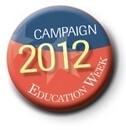Of all the issues that got some airing at this morning’s National Journal-hosted event on early childhood education, one theme resounded more than any other: Politicians, and, by extension, the people who vote for them, don’t see early learning as a priority.
That’s the case in spite of broad agreement across the political spectrum that investing both public and private dollars in early childhood programs—especially for poor kids—pays numerous dividends down the line, said a slew of panelists who participated in an event titled “Early Education for Success: Early Childhood Education’s Impact on the Economy.” And that’s the case in spite of “overwhelming” research that shows multiple, positive outcomes for children who participate in a quality early childhood program, according to Arthur J. Rolnick, a senior fellow and co-director of the Human Capital Research Collaborative at the University of Minnesota’s Humphrey School of Public Affairs, one of the panelists.

So why don’t more folks running for political office—including the White House—talk about early childhood in substantive, meaningful ways? Will we, just a little over three months from the election, finally hear Mitt Romney talk about the earliest years of learning and what policies he would support if he wins the White House? Will President Obama—who has a track record on early childhood policies to highlight, from the Race to the Top Early Learning Challenge to the overhaul of how federal Head Start funds are doled out—talk about those things beyond sound bites?
Panelist Mike Castle, a former Republican governor of Delaware and nine-term congressman, put some of the blame for the void on the media, saying that it “has just not done a good job” of covering the importance of early learning, or for that matter, K-12 education, and the direct connections to the long-term health of the economy. Reporters on the campaign trail ought to be asking about early childhood, but don’t, he said.
Fellow panelist Jon Schnur, an education advisor to President Obama, didn’t disagree with Castle, but he said candidates themselves should be raising the issue. He said that while there is political support for expanding and investing in early childhood programs, it’s not “pervasive” enough. He also didn’t miss his chance to point out that Romney hasn’t talked at all about early childhood on the campaign trail and that no one from the campaign had come to participate in the National Journal discussion on early childhood.
Rolnick offered what is the most likely reason: Kids who stand to benefit most from public investments in early childhood programs are years away from voting and very often come from households where the adults are unlikely to trek to the polls on Election Day.
The lack of public discourse about early learning and childcare (or, in some cases, the misplaced attention it gets—the pregnant Yahoo CEO being a prime example) certainly irks lots of folks. Washington Post columnist Petula Dvorak has a piece today carping about the utter absence of talk or policy focus on childcare during the infant and toddler years.
So, apart from haranguing the media into asking about early childhood issues on the campaign trail, or hoping that candidates, on their own, start raising the issue, what do we do to elevate—and sustain—the conversation? Will more statements about the smart economics of early childhood from influential people like the Fed chairman help? Please, weigh in.
And for a fuller look at the range of early childhood issues discussed at today’s event, check out this Storify treatment, which curates many of the tweets, or search #NJEarlyEd on Twitter.
